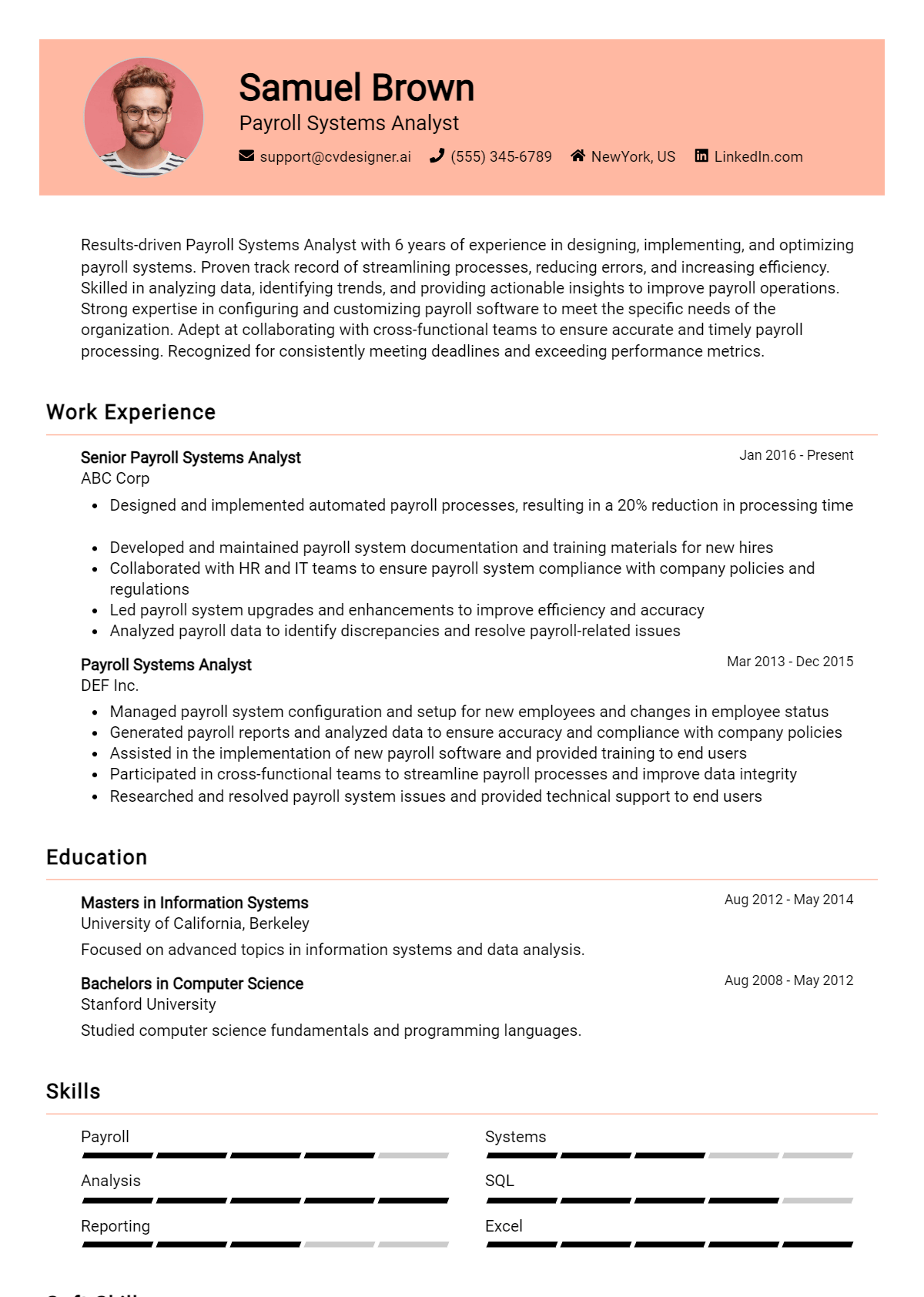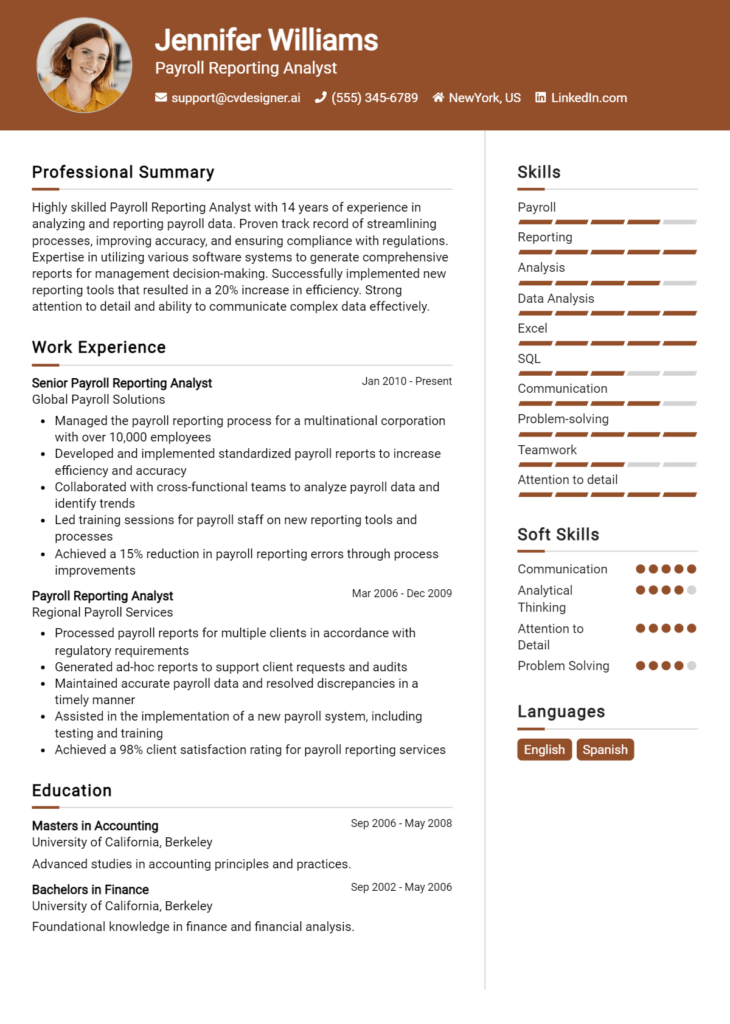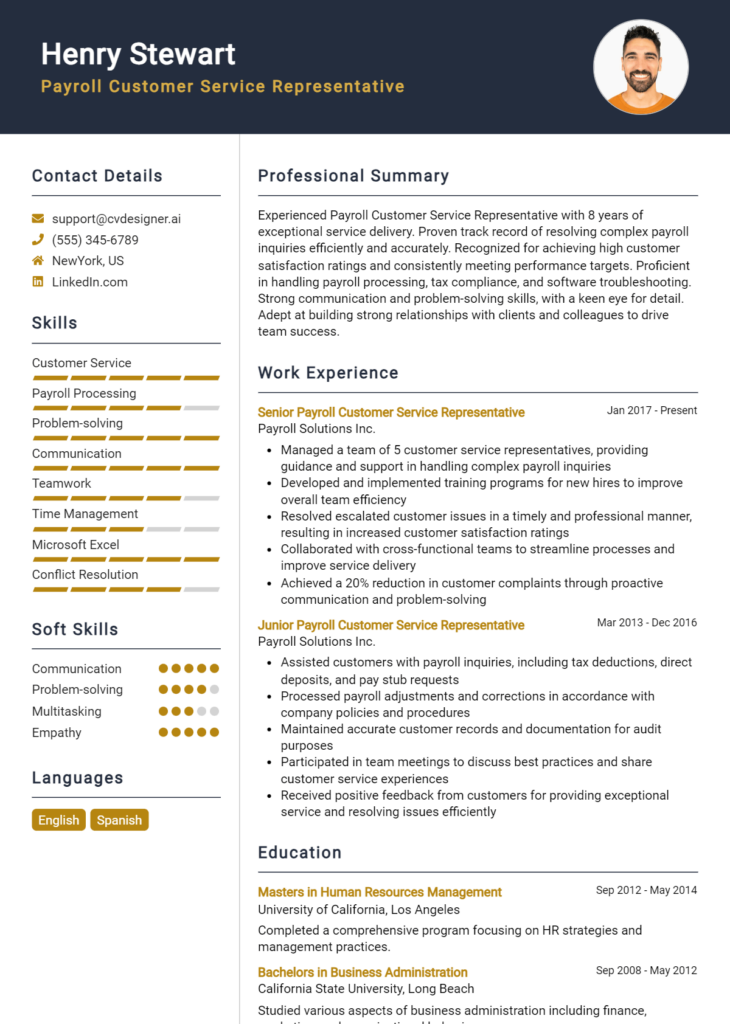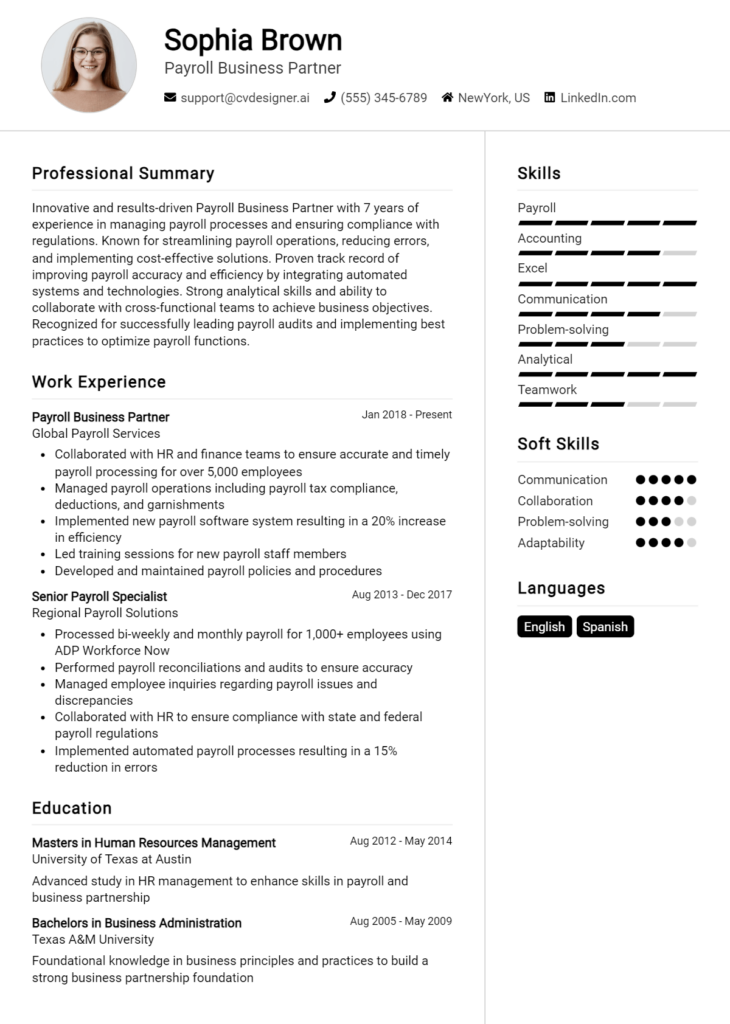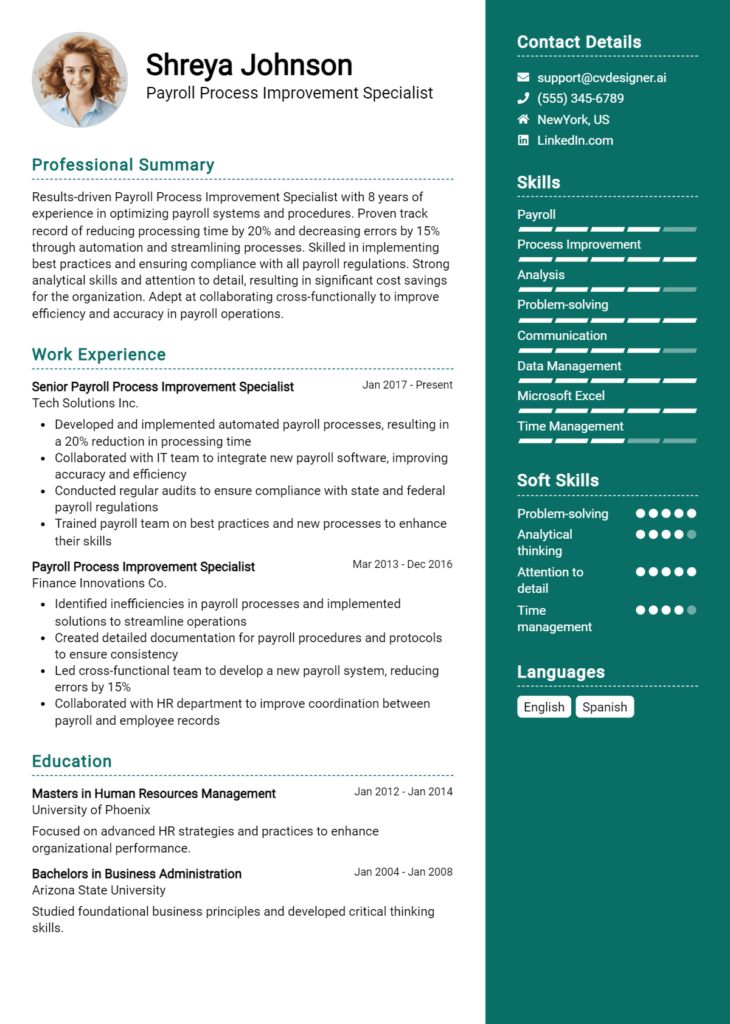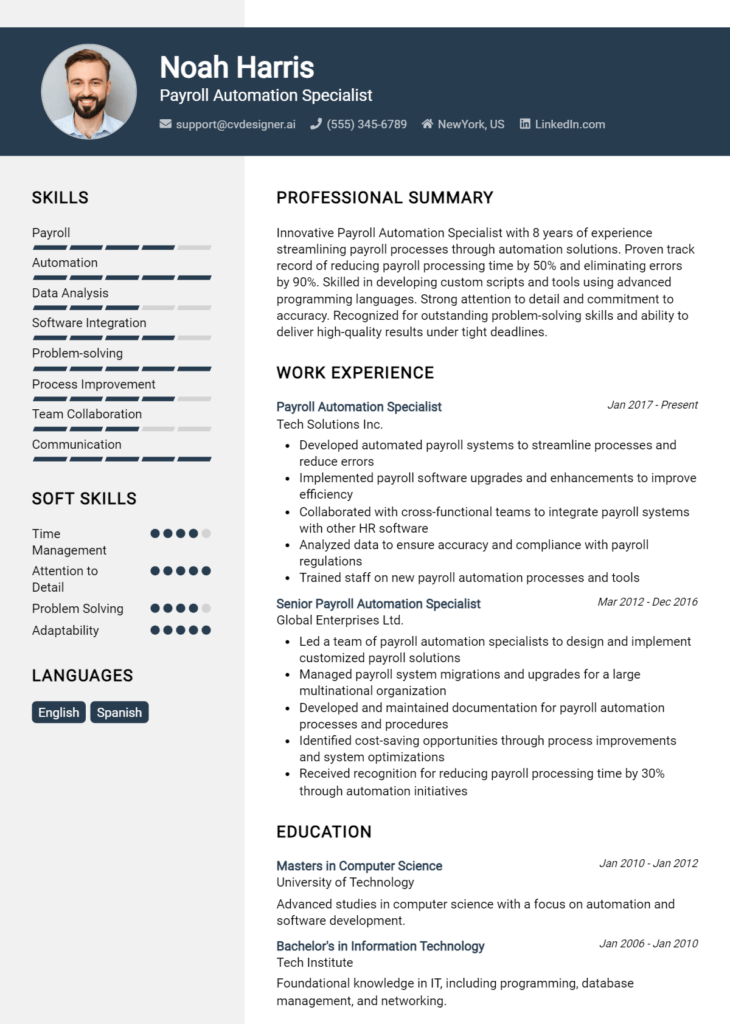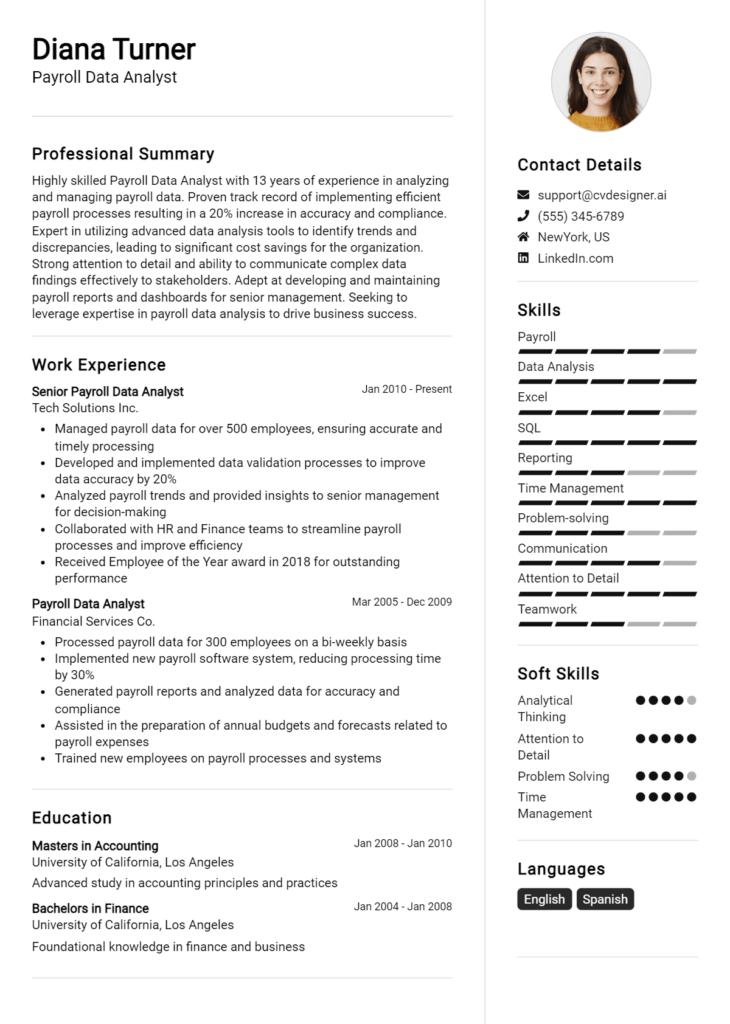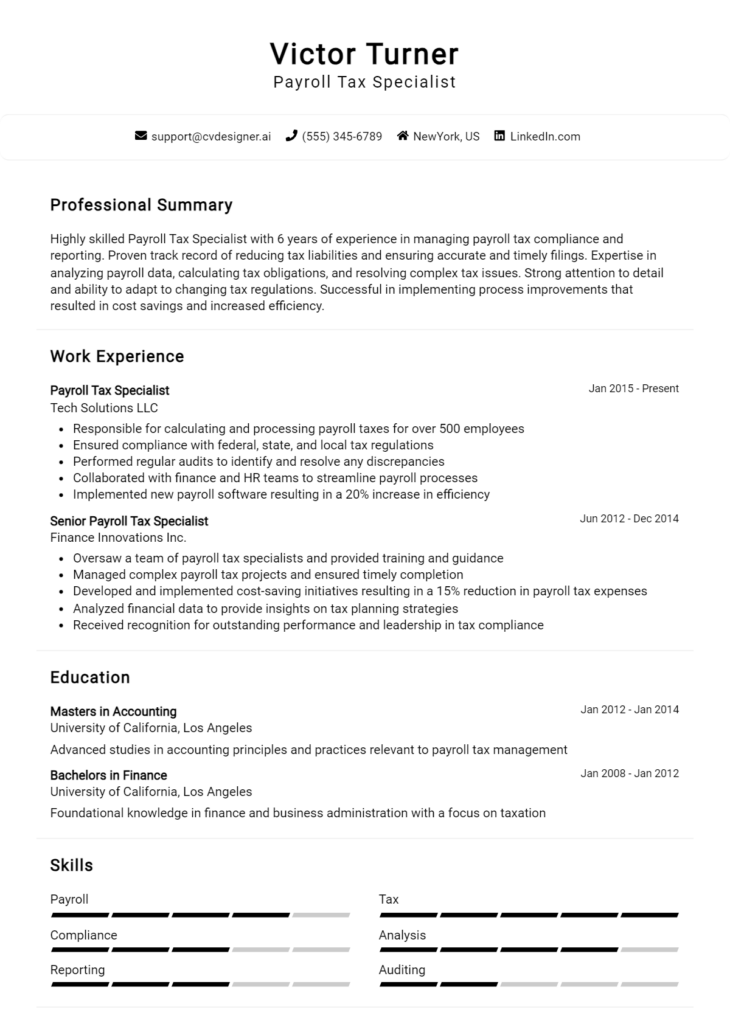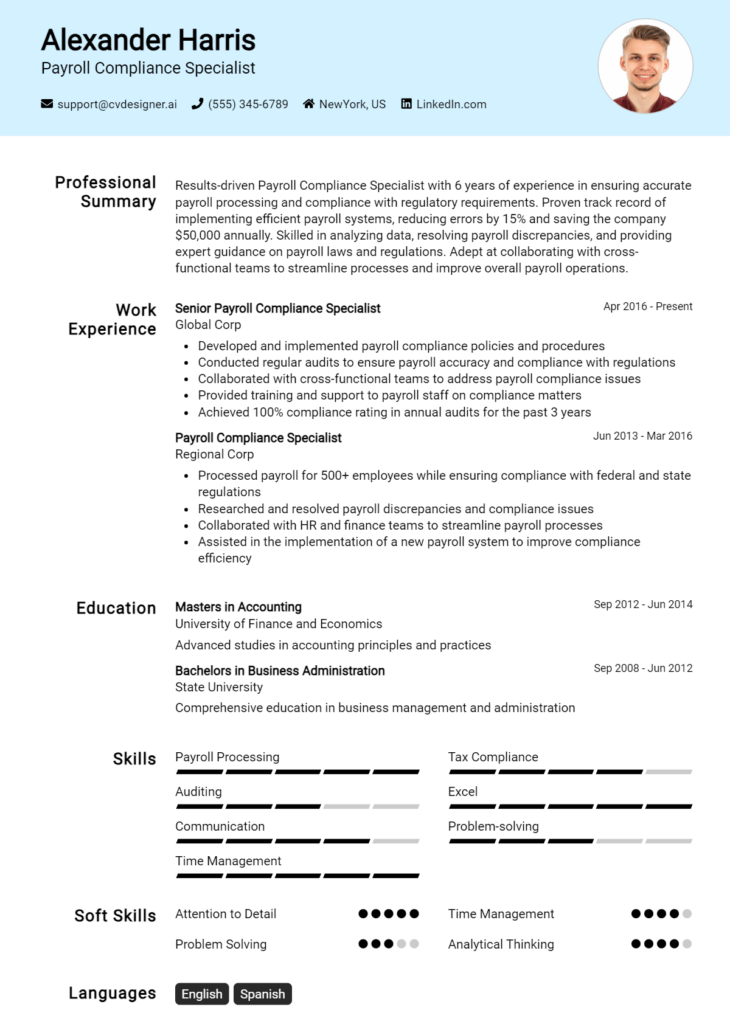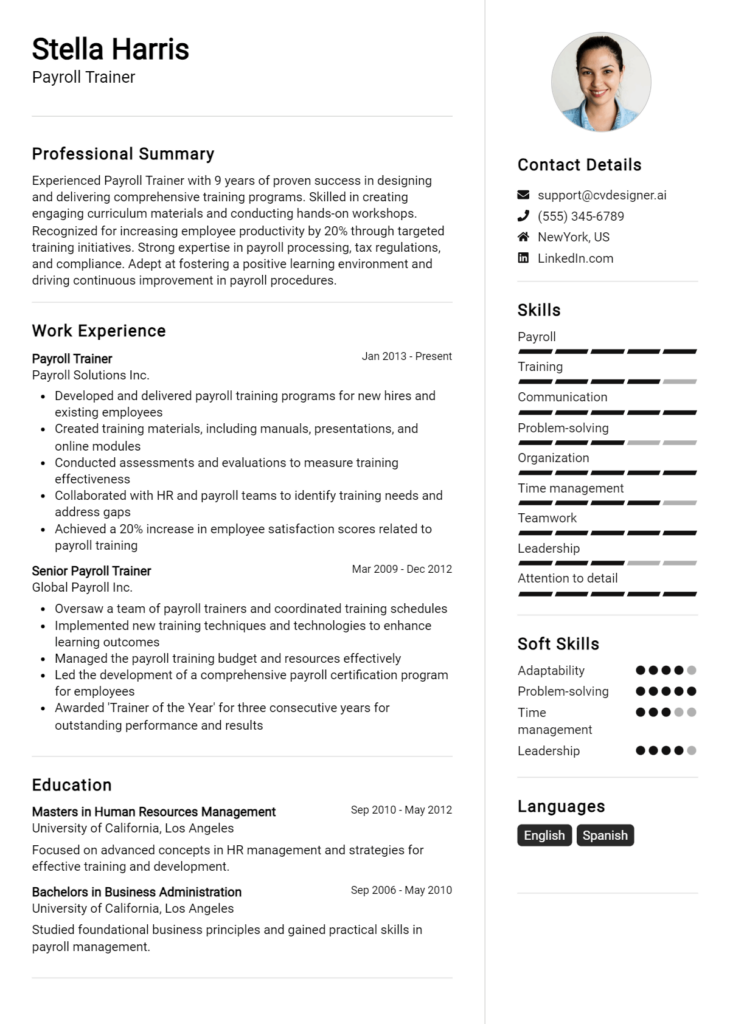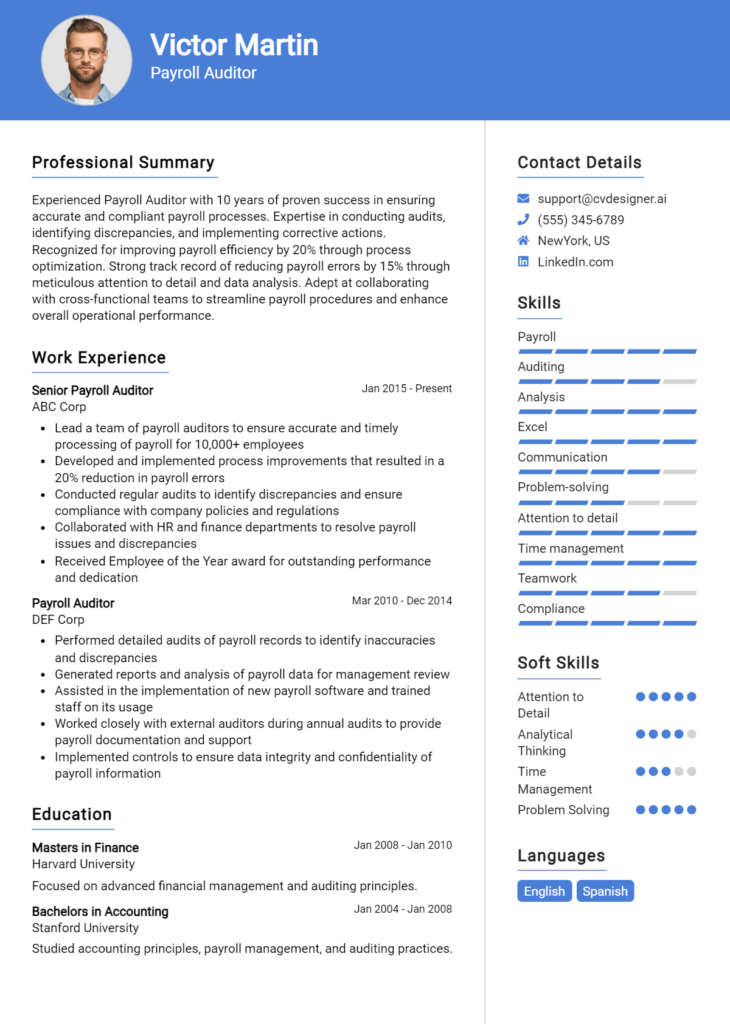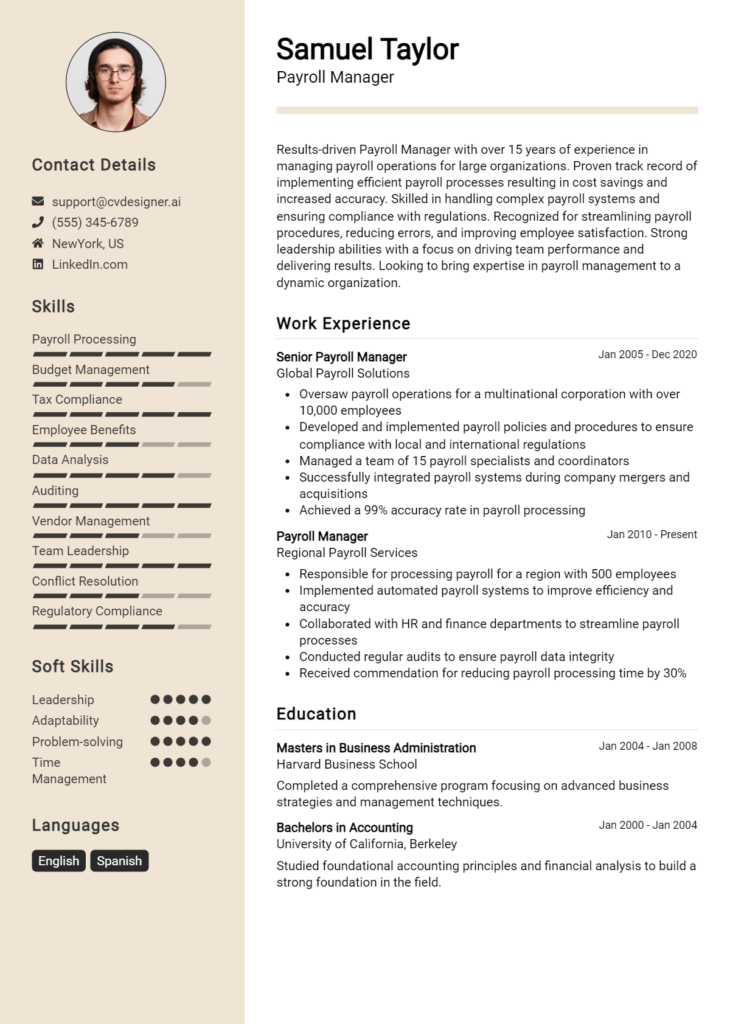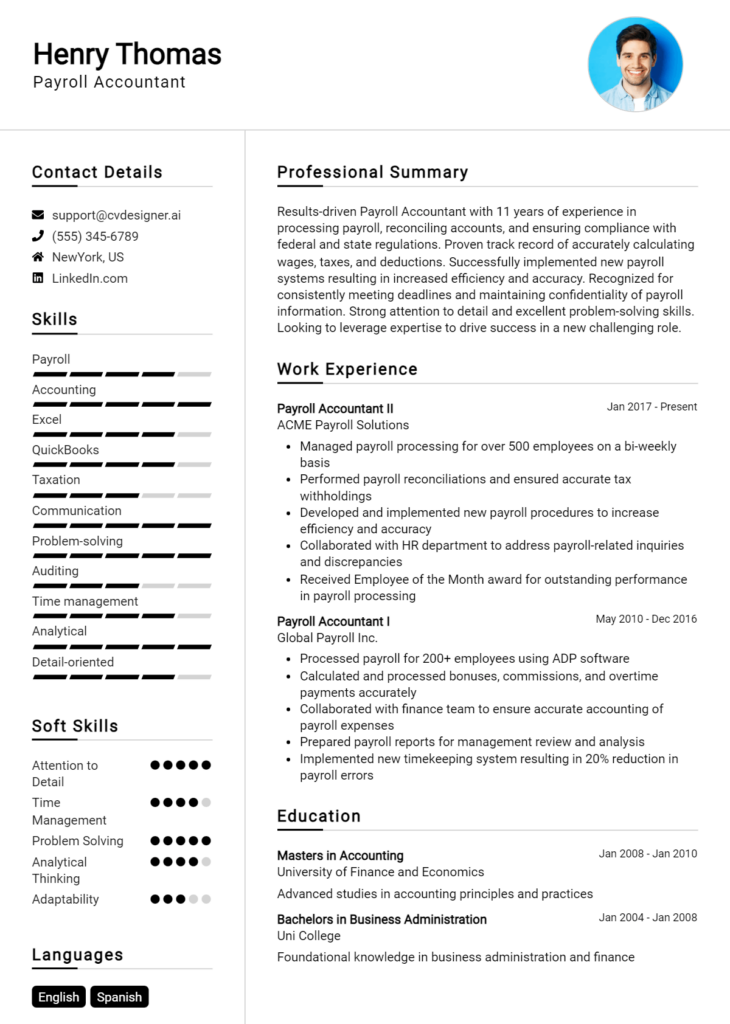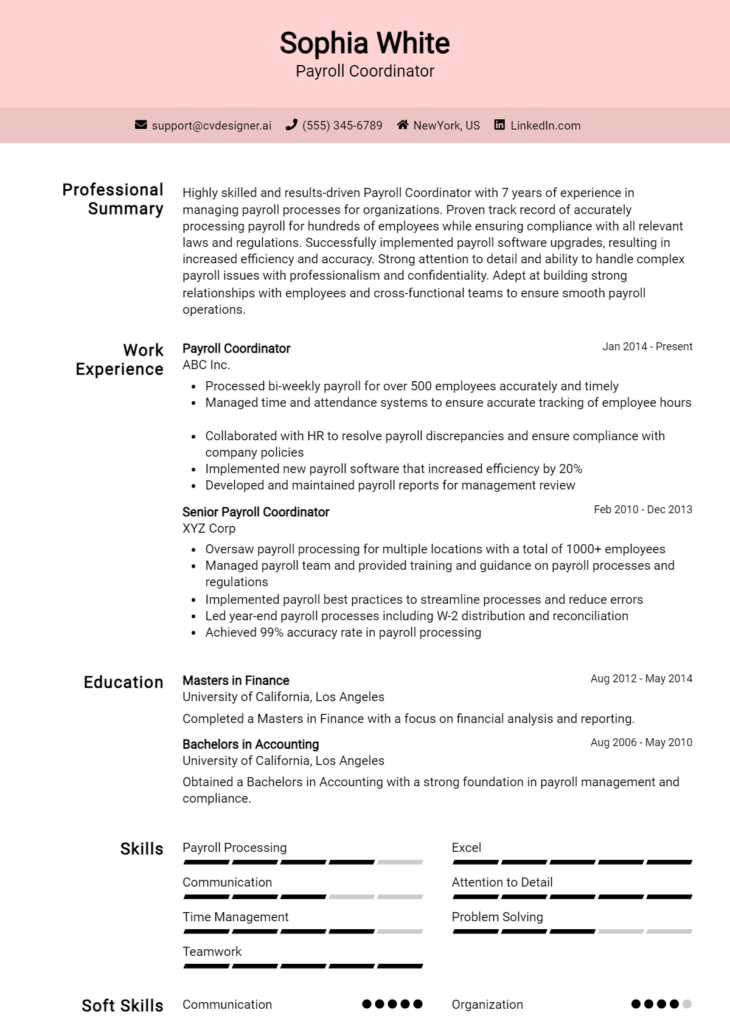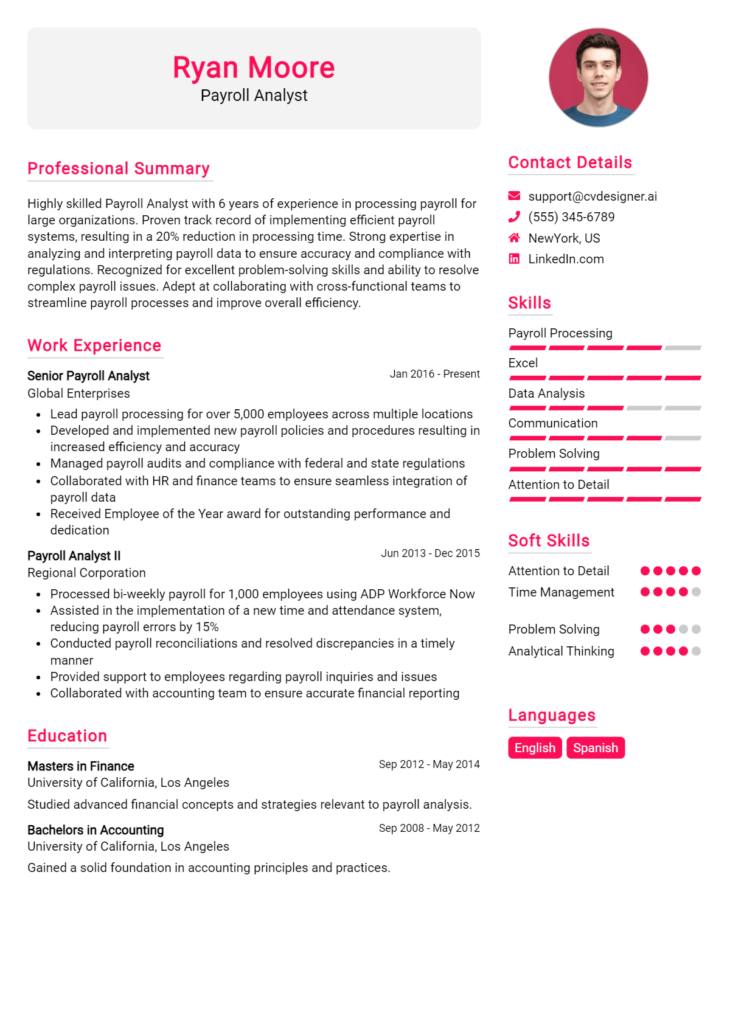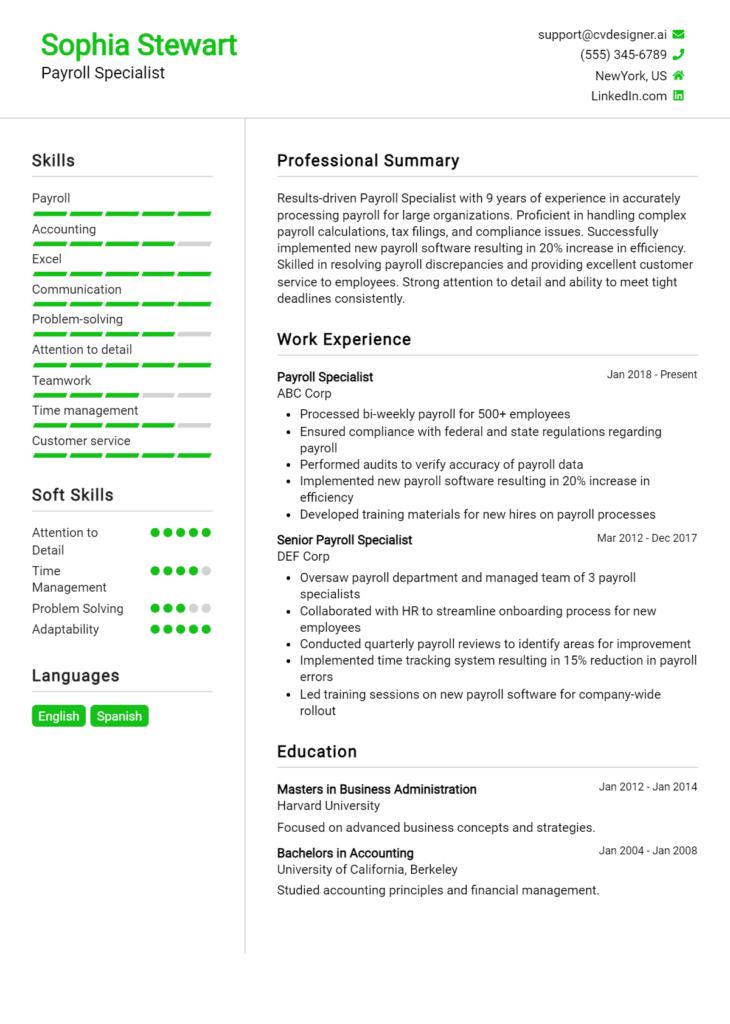Payroll Systems Analyst Core Responsibilities
A Payroll Systems Analyst plays a crucial role in managing and optimizing payroll systems to ensure accurate and timely employee compensation. This position requires strong technical skills in payroll software, along with operational expertise to analyze and improve processes. Problem-solving abilities are essential for troubleshooting issues that arise across departments, such as HR and finance. By effectively showcasing these qualifications on a well-structured resume, candidates can demonstrate their value in aligning payroll functions with the organization's overall goals.
Common Responsibilities Listed on Payroll Systems Analyst Resume
- Analyze and optimize payroll processes and systems for efficiency.
- Ensure compliance with federal, state, and local payroll regulations.
- Collaborate with HR and finance departments to resolve payroll discrepancies.
- Develop and maintain documentation for payroll procedures.
- Implement and test payroll system upgrades and enhancements.
- Conduct regular audits of payroll data for accuracy.
- Provide training and support to staff on payroll systems.
- Generate payroll reports for management analysis.
- Assist in the integration of payroll systems with other HR software.
- Monitor industry trends to recommend best practices in payroll management.
High-Level Resume Tips for Payroll Systems Analyst Professionals
In the competitive field of payroll systems analysis, a well-crafted resume serves as your first opportunity to make a lasting impression on potential employers. Your resume is not just a list of your work history; it's a strategic document that should effectively showcase your skills, experiences, and achievements relevant to the role. As a Payroll Systems Analyst, it's crucial that your resume reflects your expertise in payroll software, data analysis, and compliance, while also highlighting your contributions to previous employers. This guide will provide practical and actionable resume tips specifically tailored for Payroll Systems Analyst professionals, ensuring you stand out in the job market.
Top Resume Tips for Payroll Systems Analyst Professionals
- Tailor your resume to each job description by incorporating keywords and phrases directly from the posting.
- Highlight relevant experience by focusing on roles that involved payroll systems, data management, and process improvements.
- Quantify your achievements with specific metrics, such as percentage improvements in payroll accuracy or time savings in processing.
- Showcase your proficiency with payroll software and systems, including any certifications you hold in relevant platforms.
- Include a summary statement at the top of your resume that encapsulates your skills and career goals as they relate to payroll systems analysis.
- Demonstrate your knowledge of compliance regulations and standards in payroll processing to show your understanding of industry requirements.
- Utilize bullet points for clarity and conciseness, making it easy for hiring managers to scan your achievements quickly.
- Incorporate soft skills like problem-solving, communication, and teamwork, as they are vital in collaborative payroll environments.
- Keep your resume to one or two pages, focusing on the most relevant and recent experiences to maintain attention.
By implementing these tips, you can significantly enhance the effectiveness of your resume, thereby increasing your chances of landing a job in the Payroll Systems Analyst field. A focused and polished resume not only highlights your qualifications but also demonstrates your commitment to your professional development, making you a more attractive candidate to potential employers.
Why Resume Headlines & Titles are Important for Payroll Systems Analyst
In the competitive field of payroll systems analysis, a well-crafted resume headline or title plays a crucial role in capturing the attention of hiring managers. A strong headline serves as a powerful first impression, summarizing a candidate's key qualifications and areas of expertise in a concise and impactful way. It can immediately convey the candidate's value and relevance to the position, making it easier for employers to recognize their potential fit for the role. Therefore, it is essential for candidates to create a headline that is not only relevant to the job being applied for but also succinctly showcases their most significant strengths and experiences.
Best Practices for Crafting Resume Headlines for Payroll Systems Analyst
- Keep it concise: Aim for a headline that is short and to the point, ideally one sentence or a few impactful words.
- Be role-specific: Tailor the headline to reflect the specific role of Payroll Systems Analyst, using relevant terminology.
- Highlight key strengths: Focus on the most crucial skills or experiences that set you apart as a candidate.
- Use action words: Incorporate strong action verbs that convey your expertise and accomplishments.
- Incorporate keywords: Use industry-specific keywords that align with the job description to enhance visibility.
- Showcase achievements: If possible, include quantifiable achievements or certifications that demonstrate your capabilities.
- Maintain professionalism: Ensure that the tone of the headline remains professional and suitable for the corporate environment.
- Avoid clichés: Steer clear of overused phrases that may dilute your distinctiveness as a candidate.
Example Resume Headlines for Payroll Systems Analyst
Strong Resume Headlines
Innovative Payroll Systems Analyst with 5+ Years of Experience in Streamlining Payroll Processes
Detail-Oriented Payroll Specialist Proficient in SAP and ADP, Enhancing Efficiency and Compliance
Data-Driven Payroll Analyst Committed to Delivering Accurate Reporting and Cost-Saving Strategies
Certified Payroll Professional (CPP) with Expertise in Multi-State Payroll Management and Tax Compliance
Weak Resume Headlines
Payroll Analyst Looking for Job
Experienced Worker in Payroll Systems
Hardworking Payroll Specialist
The strong headlines are effective because they immediately communicate the candidate's expertise, relevant experience, and specific skills that align with the Payroll Systems Analyst role. They utilize industry-specific language and highlight achievements, making them compelling to hiring managers. In contrast, the weak headlines fail to impress as they are vague, lack specificity, and do not convey any notable qualifications or unique selling points, which may lead hiring managers to overlook these candidates in favor of those who present a clearer picture of their capabilities.
Writing an Exceptional Payroll Systems Analyst Resume Summary
A well-crafted resume summary is crucial for a Payroll Systems Analyst as it serves as the first impression to hiring managers. This brief yet powerful section quickly communicates the candidate's key skills, relevant experience, and notable accomplishments, making it easier for employers to see the potential fit for the role. A strong summary not only highlights the candidate's qualifications but also conveys enthusiasm and understanding of the industry, all while being concise and tailored to the specific job description. An impactful resume summary can significantly increase the chances of standing out in a competitive job market.
Best Practices for Writing a Payroll Systems Analyst Resume Summary
- Quantify Achievements: Use specific numbers to highlight your impact, such as the percentage of payroll accuracy or the number of employees managed.
- Focus on Relevant Skills: Emphasize skills directly related to payroll systems, such as proficiency in payroll software, data analysis, and compliance knowledge.
- Tailor for Each Job: Customize your summary to align with the job description, incorporating keywords and phrases that reflect the employer's needs.
- Highlight Certifications: Mention any relevant certifications, such as Certified Payroll Professional (CPP) or similar credentials.
- Showcase Industry Experience: Include years of experience in payroll systems or related fields to establish credibility.
- Be Concise: Aim for 3-5 sentences that deliver a clear message without unnecessary jargon or fluff.
- Use Active Language: Start sentences with strong action verbs to convey confidence and initiative.
- Reflect Professionalism: Maintain a formal tone that reflects the professionalism required in payroll management.
Example Payroll Systems Analyst Resume Summaries
Strong Resume Summaries
Dynamic Payroll Systems Analyst with over 7 years of experience in optimizing payroll processes for large organizations. Achieved a 99% payroll accuracy rate while managing payroll for over 2,500 employees using ADP Workforce Now.
Results-driven professional skilled in implementing payroll systems and ensuring compliance with federal regulations. Successfully reduced payroll processing time by 30% through system enhancements and cross-training team members.
Detail-oriented Payroll Systems Analyst with a proven track record of leveraging data analysis to streamline payroll operations. Recognized for improving data reporting accuracy by 40% and enhancing system functionality to support organizational growth.
Weak Resume Summaries
Experienced payroll analyst looking for a new opportunity. I have worked with payroll systems and understand the importance of accuracy.
Dedicated professional with some experience in payroll. I want to help companies with their payroll needs and improve processes.
The strong resume summaries stand out because they are specific, quantifiable, and highlight relevant skills and experiences that directly relate to the role of a Payroll Systems Analyst. They provide concrete results and demonstrate an understanding of the position. In contrast, the weak summaries lack detail, fail to mention achievements, and are overly generic, making them less effective at capturing the attention of hiring managers.
Work Experience Section for Payroll Systems Analyst Resume
The work experience section of a Payroll Systems Analyst resume is crucial as it serves as a testament to the candidate's technical skills and their ability to manage teams effectively while delivering high-quality products. This section not only details the practical application of expertise in payroll systems but also highlights the candidate's capacity to drive results through collaboration and innovation. By quantifying achievements and aligning the experience with industry standards, candidates can demonstrate their value and suitability for the role, making a compelling case to potential employers.
Best Practices for Payroll Systems Analyst Work Experience
- Highlight specific technical skills relevant to payroll systems, such as software proficiency and data analysis capabilities.
- Quantify achievements with metrics, such as percentage improvements in payroll accuracy or time saved in processes.
- Emphasize experience in leading teams or projects, showcasing leadership and collaboration.
- Include industry-standard practices and methodologies you've implemented in past roles.
- Tailor your experience to the job description, aligning your skills with the needs of the employer.
- Use action verbs to describe your responsibilities and achievements, creating a dynamic and engaging narrative.
- Document any relevant certifications or training that enhance your qualifications as a Payroll Systems Analyst.
- Showcase your problem-solving skills with examples of challenges faced and how you overcame them.
Example Work Experiences for Payroll Systems Analyst
Strong Experiences
- Led a cross-functional team to implement a new payroll software system, resulting in a 25% reduction in processing time and a 15% increase in payroll accuracy.
- Developed and executed a data validation process that decreased payroll discrepancies by 30%, enhancing employee satisfaction and trust in payroll operations.
- Managed a project to integrate payroll systems with HR software, successfully reducing manual entry errors by 40% and streamlining workflow.
- Conducted training sessions for a team of 10 on new payroll regulations and software updates, improving compliance rates by 20% within the first quarter.
Weak Experiences
- Worked on payroll systems.
- Participated in team meetings regarding payroll.
- Helped with various payroll-related tasks.
- Assisted in the implementation of a new system.
The examples labeled as "strong" are considered effective because they provide concrete metrics and outcomes, demonstrating the candidate's impact on the organization. They showcase leadership, collaboration, and specific technical skills relevant to payroll systems. In contrast, the "weak" examples lack detail and quantifiable results, making them vague and unimpressive. They fail to convey the candidate's contributions or align with what employers typically seek in a Payroll Systems Analyst, highlighting the importance of specificity and achievement in this critical section of the resume.
Education and Certifications Section for Payroll Systems Analyst Resume
The education and certifications section of a Payroll Systems Analyst resume plays a crucial role in establishing the candidate's qualifications and commitment to professional growth. This section not only highlights the academic background and relevant coursework, but also showcases industry-recognized certifications that demonstrate a candidate's expertise in payroll systems and compliance. By emphasizing continuous learning efforts through specialized training, applicants can significantly enhance their credibility and alignment with the job role, making them more appealing to potential employers.
Best Practices for Payroll Systems Analyst Education and Certifications
- List degrees that are directly relevant to payroll systems, such as Accounting, Finance, or Human Resources.
- Include industry-recognized certifications, such as Certified Payroll Professional (CPP) or Payroll Compliance Practitioner (PCP).
- Provide details of relevant coursework or projects that demonstrate practical application of payroll systems knowledge.
- Highlight any specialized training or workshops that relate to payroll software or compliance regulations.
- Use clear headings and consistent formatting for easy readability and professional appearance.
- Consider including ongoing education or certifications to showcase a commitment to staying current in the field.
- Prioritize the most relevant and recent education and certifications, placing them at the top of the section.
- Avoid including irrelevant degrees or certifications that do not pertain to payroll systems analysis.
Example Education and Certifications for Payroll Systems Analyst
Strong Examples
- Bachelor of Science in Accounting, University of XYZ, Graduated May 2020
- Certified Payroll Professional (CPP), American Payroll Association, Certification Date: June 2022
- Coursework in Payroll Systems Management, including Advanced Payroll Accounting and Compliance Regulations
- Certification in HRIS and Payroll Software from ABC Training Institute, Completed March 2023
Weak Examples
- Associate Degree in General Studies, Community College of ABC, Graduated May 2018
- Certification in Basic Computer Skills, Online Learning Center, Completed August 2021
- High School Diploma, Anytown High School, Graduated June 2015
- Outdated certification in Manual Payroll Processing, Issued in 2010
The strong examples are considered relevant as they directly relate to the skills and knowledge required for a Payroll Systems Analyst, showcasing both educational qualifications and certifications that enhance the candidate's profile. In contrast, the weak examples lack relevance to the job role and may indicate a lack of focus on the necessary expertise, thereby diminishing the candidate's marketability in a competitive job landscape.
Top Skills & Keywords for Payroll Systems Analyst Resume
As a Payroll Systems Analyst, having the right skills is crucial for ensuring the effective management and optimization of payroll systems. These professionals play a vital role in maintaining the accuracy of payroll processes, troubleshooting issues, and providing analytical insights that drive efficiency. A well-crafted resume that highlights both hard and soft skills can make a significant difference in securing a position in this field. By showcasing your capabilities in areas such as data analysis, compliance, and communication, you can demonstrate your value to potential employers. For additional tips on how to emphasize your skills and work experience, consider exploring the resources available on skills and work experience.
Top Hard & Soft Skills for Payroll Systems Analyst
Hard Skills
- Payroll Software Proficiency (e.g., ADP, Paychex)
- Data Analysis and Reporting
- Regulatory Compliance Knowledge (FLSA, IRS guidelines)
- Systems Integration and Implementation
- SQL and Database Management
- Excel Advanced Functions (VLOOKUP, PivotTables)
- Timekeeping Systems Management
- Project Management
- Troubleshooting and Problem Solving
- Knowledge of Labor Laws and Taxation
- Technical Documentation Skills
- Business Process Optimization
- Payroll Auditing Techniques
- Software Development Lifecycle (SDLC) Familiarity
Soft Skills
- Strong Analytical Thinking
- Excellent Communication Skills
- Attention to Detail
- Team Collaboration
- Adaptability and Flexibility
- Time Management
- Critical Thinking
- Customer Service Orientation
- Conflict Resolution Skills
- Initiative and Proactivity
- Organizational Skills
- Empathy and Understanding
- Active Listening
- Interpersonal Skills
- Decision Making
- Stress Management
- Creativity in Problem Solving
- Relationship Building
Stand Out with a Winning Payroll Systems Analyst Cover Letter
As a dedicated Payroll Systems Analyst with over five years of experience in optimizing payroll systems and enhancing operational efficiency, I am excited to apply for the Payroll Systems Analyst position at [Company Name]. My background in payroll processing, system integration, and data analysis aligns well with the qualifications you seek, and I am eager to contribute my expertise to your team. I have a proven track record of successfully implementing payroll solutions that meet organizational needs while ensuring compliance with ever-changing regulations.
In my previous role at [Previous Company Name], I played a pivotal role in the transition to a new payroll software system, which improved processing time by 30% and reduced errors by 25%. I collaborated closely with cross-functional teams to gather requirements, conduct system testing, and provide user training, ensuring a smooth transition and user acceptance. My analytical skills allow me to identify inefficiencies and propose actionable solutions, ultimately streamlining payroll operations and enhancing employee satisfaction.
I am particularly drawn to this opportunity at [Company Name] because of your commitment to leveraging technology for improved payroll accuracy and employee experience. I am excited about the chance to work with a forward-thinking team that values innovation and continuous improvement. My experience in data analysis and reporting will enable me to contribute to your objectives by providing insightful reports that drive informed decision-making.
Thank you for considering my application. I look forward to the opportunity to discuss how my background and skills can benefit [Company Name]. I am eager to bring my passion for payroll systems and my commitment to excellence to your esteemed organization.
Common Mistakes to Avoid in a Payroll Systems Analyst Resume
When crafting a resume for the position of a Payroll Systems Analyst, it's essential to present your skills and experiences in a manner that aligns with the expectations of potential employers. However, many candidates make common mistakes that can undermine their chances of landing an interview. Understanding these pitfalls can help you create a more effective resume that highlights your qualifications and suitability for the role.
Lack of Specificity: Failing to provide specific examples of your achievements can make your resume less compelling. Instead of saying you "improved payroll processes," quantify your impact, such as "reduced payroll processing time by 20%."
Ignoring Relevant Keywords: Many companies use applicant tracking systems (ATS) to filter resumes. Not including industry-specific keywords related to payroll systems can result in your resume being overlooked.
Overloading with Jargon: While it's important to demonstrate your expertise, using too much technical jargon can alienate hiring managers. Strive for a balance that showcases your knowledge while remaining accessible.
Neglecting Soft Skills: Payroll Systems Analysts need strong analytical and problem-solving abilities, but soft skills like communication and teamwork are equally important. Failing to mention these can give an incomplete picture of your capabilities.
Poor Formatting: A cluttered or overly complicated resume layout can detract from your qualifications. Use clear headings, bullet points, and consistent formatting to enhance readability.
Listing Irrelevant Experience: Including unrelated job experiences can dilute your resume's focus. Tailor your work history to highlight roles and responsibilities that specifically relate to payroll systems and analytics.
Not Tailoring the Resume for Each Job: Sending the same resume to multiple employers can be detrimental. Customize your resume for each application by aligning your skills and experiences with the specific job description.
Neglecting to Proofread: Spelling and grammatical mistakes can create a negative impression. Take the time to thoroughly proofread your resume, or ask someone else to review it for clarity and accuracy.
Conclusion
As a Payroll Systems Analyst, your role is crucial in ensuring that payroll processes run smoothly and efficiently. Key responsibilities typically include analyzing payroll systems, enhancing existing processes, ensuring compliance with regulations, and collaborating with various departments to resolve issues. It’s essential to showcase your technical skills, attention to detail, and problem-solving abilities on your resume to attract potential employers.
To stand out in the competitive job market, it’s vital to have a well-structured and compelling resume that highlights your qualifications and achievements. Make sure to focus on measurable outcomes and relevant experiences that demonstrate your expertise in payroll systems and analysis.
If you haven’t reviewed your Payroll Systems Analyst resume recently, now is the perfect time to do so. Consider utilizing available resources to enhance your job application materials. Check out a variety of resume templates to find a design that suits your professional style. For a more personalized touch, use the resume builder to create a customized resume that showcases your skills effectively. Additionally, explore resume examples for inspiration on how to structure your content, and don’t forget to craft a compelling cover letter using the cover letter templates available.
Take action today to refine your resume and position yourself as a strong candidate in the payroll field!

